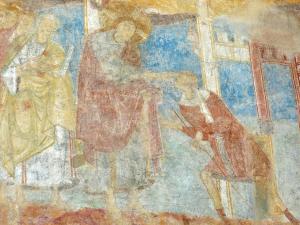
No doubt about it; people often are the cause of their own afflictions. Someone who drinks alcohol, drives a car and has an accident is responsible for whatever injury they or others suffer. If they end up paralyzed, they only have themselves to blame. Sin, likewise, produces its own consequences (which we often understand punishments). Nonetheless, we must be careful and not assume all suffering is the result of sin. The fact that people are responsible for some of the suffering they experience in life must not be used to suggest people are responsible for all the ills they experience on a day to day basis. That is, we should not look to someone, see their present condition, and judge them solely on the basis of what we see. If we do so, we often turn a blind eye to their suffering, as we judge them unjustly, thinking they deserve what they get. It is an easy mistake to make, but logically, it is not sound. Just as we would be mistaken if we said every feline is a tiger because every tiger is a feline, it would be wrong to assume everyone suffering from some grievous pain or sorrow in their lives is responsible for what they suffer (let alone, they do not deserve any mercy even if they have to face the consequences of their actions).
Certainly, it would make things easier if every ill someone experience is the result of some wrong on their part. We must not confuse with such simplicity with truth. We would certainly like people to treat us kindly if we turn out to have a genetic defect which eventually cripples us, so why should we treat others differently? Sadly, people often do not treat others as they would like to be treated. They are quick judge others. If someone is sick, poor, and hungry, they are told that they are lazy and deserve what they get. Job’s friends tried to make such a case for Job, saying he must have committed some horrible sin because of the afflictions he and his family experienced; instead, they were the ones sinning, degrading the righteous Job. Likewise, when Jesus encountered a man who had been born blind, there were some who thought that he or his family had to have been guilty of some sin for this to have happened. Jesus, with compassion and grace, rejected that claim as he said that the man was born blind without anyone to blame for his condition:
As he passed by, he saw a man blind from his birth. And his disciples asked him, “Rabbi, who sinned, this man or his parents, that he was born blind?” Jesus answered, “It was not that this man sinned, or his parents, but that the works of God might be made manifest in him. We must work the works of him who sent me, while it is day; night comes, when no one can work. As long as I am in the world, I am the light of the world” (Jn. 9:1-5 RSV).
The man was blind. Nature, that is the natural order set up by God, led to his blindness. That is the work of God in setting up nature and the natural order allows for some to suffer as a result of natural processes, with no one person having done anything deserving what they experience. Thus, what was important here was the declaration that no one was guilty of any sin. The man born blind was not being punished. But, just as with Job, so we find with the blind man, that, despite his suffering, God was at work in and with him and God’s glory shined in and through him. The glory was not found in the blindness; God did not set about to make the man blind as a way to later reveal the divine glory, but rather, in and through the man, just as in and through everyone, no matter the circumstances we find ourselves in, God’s glory can be found and shine through.
When we are open to God and God’s glory, God is able to be with us, and when God is with us, God’s glory is revealed. Everyone is born in order to glorify God in their lives, no matter the circumstances they find themselves in. This is because everyone contains the image and likeness of God in them. Everyone can and will show the glory of God if they but cooperate with that image. And then sometimes, that glory is so great, that through it, some sort of extraordinary event or miracle is produced.
Thus the blind man, St. Celidonius, was healed by Jesus. Despite the fact he had been blind, people would not listen to him when he wanted to tell them what he had experienced. They believed he was a sinner, making his testimony worthless: “They answered him, ‘You were born in utter sin, and would you teach us?’ And they cast him out” (Jn. 9:34 RSV). Even though he had been healed, the people wanted to continue to accuse him and use his sufferings as an excuse to ignore him and what he had to say. Once people make a rash judgment, they often do not want to be proven wrong, and will ignore any and all proof which otherwise could be given to show they are wrong. They will use all kinds of justifications, all kinds of confirmation bias, to keep to their faulty judgment. Even if the man had been a sinner, he was not merely a sinner, he was still made in the image and likeness of God, and had a dignity of his own given to him by God. Even if he had truly been a sinner, God worked a miracle through him, and so the people should have listened to what he had to say and give a just judgment to what happened instead of dismissing him as they did (using an ad hominem argument to do so).
St. Celidonius was born to glorify God, and he glorify God he did. He fulfilled his mission, and would have fulfilled it whether or not his eyesight had been healed. He was not, as people claimed, a sinner who cut himself off from God. He suffered, and probably like all who suffered, he had questions as to why he suffered, But he also knew, like Job, it was not because of anything he had done. He had faith. He had a heart for God, and with it, he perceived the truth in a way that those who had sight did not. He glorified God, and after he had been healed, he continued to glorify God. It was natural for him to follow after Jesus, because he knew what Jesus had done for him. He did not need to listen to the opinions of others, he did not need to listen to their theological arguments, for he had encountered Jesus for himself. And later, when he encountered Jesus again, he bowed down and worshiped the one who had healed him:
Jesus heard that they had cast him out, and having found him he said, “Do you believe in the Son of man?” He answered, “And who is he, sir, that I may believe in him?” Jesus said to him, “You have seen him, and it is he who speaks to you.” He said, “Lord, I believe”; and he worshiped him (Jn. 9:35-38 RSV).
There are many lessons which we can learn from this story. We can talk about the way the man born blind is an allegory for all of humanity. We can talk about spiritual blindness and the way Jesus, as the light of the world, restores our spiritual sight. But what is often not discussed is the way the story undermines all victim shaming. For victims find themselves often accused of doing something bad which justifies them being made into victims, and once that happens, what they have to say is ignored. The man born blind experienced all the gaslighting victims experienced. When he would not accept such gaslighting, he was, like so many victims, cast out, suffering further indignities and abuse because he did not conform to social expectations and desires of those in power. But Jesus welcomed him, and in doing so, showed us the way we should be; we should not engage victim shaming. We must listen to them. We must affirm their dignity and give due diligence and consider what they have to say. We must not cast them out, finding any excuses we can to justify further abuse against those who have already suffered much. Instead, we must see the goodness in their lives. We must discern the way God is at work in and through them, illuminating the dark situation which needs to be rectified. And so, instead of ignoring them, instead of dismissing them, instead of making them suffer further indignities, we should lift up their voice, work for justice, and do what we can to help bring them the healing which they so desperately need.
Stay in touch! Like A Little Bit of Nothing on Facebook.
If you liked what you read, please consider sharing it with your friends and family!
















